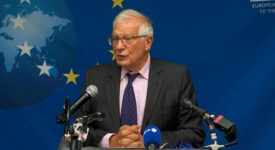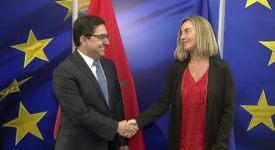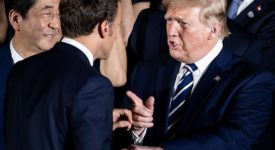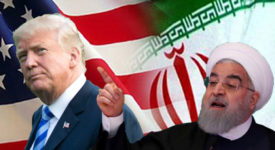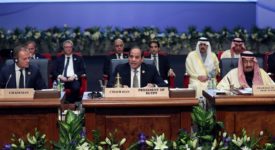The Middle East peace process (MEPP) has become a specific barometer to measure different dimensions of European influence and the EU’s ambition to be seen more as a ‘global actor’. Since 2002, the European Union has played an active part in the practice of third-party mediation in the MEPP within the so-called the Middle East Quartet. Nevertheless, though the Quartet is regarded as an indispensable forum for EU’s extensive political involvement in the MEPP, being a member formally on a par with the US, Russia and the UN, there is no consensus about qualitative dimensions of EU’s role and influence. For some observers, the inclusion of the EU within the Quartet was an acknowledgement of its growing political role in the peace process as well as of the legitimacy of its involvement as a major contributor to Palestinian institution building.
For other analysts and practitioners of mediation, even though the Quartet formally implied a dramatic departure from past U.S. peacemaking approaches, until today there has been an implicit “division of labour” within it. According to this division, the US invariably dominates the political agenda relegating the European ‘voice’ and ‘visibility’ to subordinate positions. A prominent insider, the former Quartet envoy James Wolfensohn, admitted that there “was never a desire on the part of the Americans to give up control of the negotiations”. This line of thinking is also shared by the Arab League Chief, Amr Mousa, who metaphorically named this foursome as the “quartet sans trois”.
At the same time, any analysis of EU’s current and perspective role should be based on a realistic assessment of its constraints and opportunities. It should also take into consideration the positions of other Quartet players as well as the local contending parties – Israel and the Palestinian Authority. Although the EU’s quest for specific autonomy from the US actions was formalised with the accession to the Quartet, it would currently be rather unrealistic to expect for the EU to assume a greater role than the United States in implementing the two-state solution.
To a large extent, a more influential European role in the Quartet is inter alia a function of the willingness of Israel and the United States to accept such an enhanced role. One of the most frequent concepts used by the Israelis in their discourse concerning the EU is the so-called ‘balanced policy approach’ attributed to a number of historical, demographic and political factors present in the European landscape. An identical expectation of ‘even-handedness’ is also manifested by the Palestinian negotiators with regard to EU’s role and actions in the peace process.
Another significant factor accounting for (non-)acceptance by Israel of European conceptual vision of the two-state solution in terms of strategy and tactics is the former’s own diplomatic approach. While the EU has favoured, due to its multilateral institutional architecture, a multilateral approach to the peace process, Israel has on multiple occasions preferred discussion of key issues on a bilateral basis. Nevertheless, a deeper analysis into the past European initiatives and contribution to regular practices and policies of the Quartet indicates that the EU’s role is more than a sum of assumed pressures exerted on the local parties or opportune transitions from one stage to another as envisaged by the Roadmap.
First of all, the Quartet as an international mechanism reflects one of the fundamental principles of EU foreign and security policy – multilateralism. The Quartet membership has facilitated the EU’s access to key policy-makers in the US and Russian governments, the United Nations, as well as within the region itself. Thus, this allows the EU to act as a ‘serious player’, and not only as a ‘payer’, and operate as part of this ‘machinery for mutual influence’ – the Quartet.
Secondly, the EU has become a key initiator and contributor to the idea of the Quartet’s reaching to Israel’s and Palestine’s neighbours and the regional parties, which is now effectively a Quartet policy. For instance, the Quartet issued a statement in 2007 that it “agreed to meet in the region with members of the Arab League to follow up on the Arab Peace Initiative and efforts to advance the regional track”. The Quartet’s commitment to a broader regional involvement is consistent with EU’s longstanding conceptual vision of a comprehensive and inclusive settlement of the Arab-Israeli conflict.
Thirdly, in terms of the peace process, the above-mentioned parameters of EU’s external ‘actorness’ are complemented by a number of internal factors within the EU. Former practices of pursuing disparate national agendas by EU member states are increasingly replaced by their commitment to cooperation. France and the UK intensively deepen their foreign policy actions within the EU institutions, while Germany, according to German Foreign Ministry, has been actively promoting its Middle East policy within “Europe’s own policy for the region”. These and other developments encourage most observers to speak of EU’s external and internal legal formal competence to act within the framework of the Quartet.
Though it is difficult to measure the weight of any Quartet actor relative to the others and the real extent to which the EU and the US are aligning their differences behind the scenes, the Quartet is an essential forum for the projection and enhancement of European visibility and influence. We can regard it as a potential arena, in which the Europeans could make contemporary and perspective efforts to implement their multilateral vision of a comprehensive Arab-Israeli peace. The EU should pursue its Quartet membership with more dynamism by focusing on more coordination with all the other Quartet actors as well as by sustaining the approaches that are accepted by the local parties.

